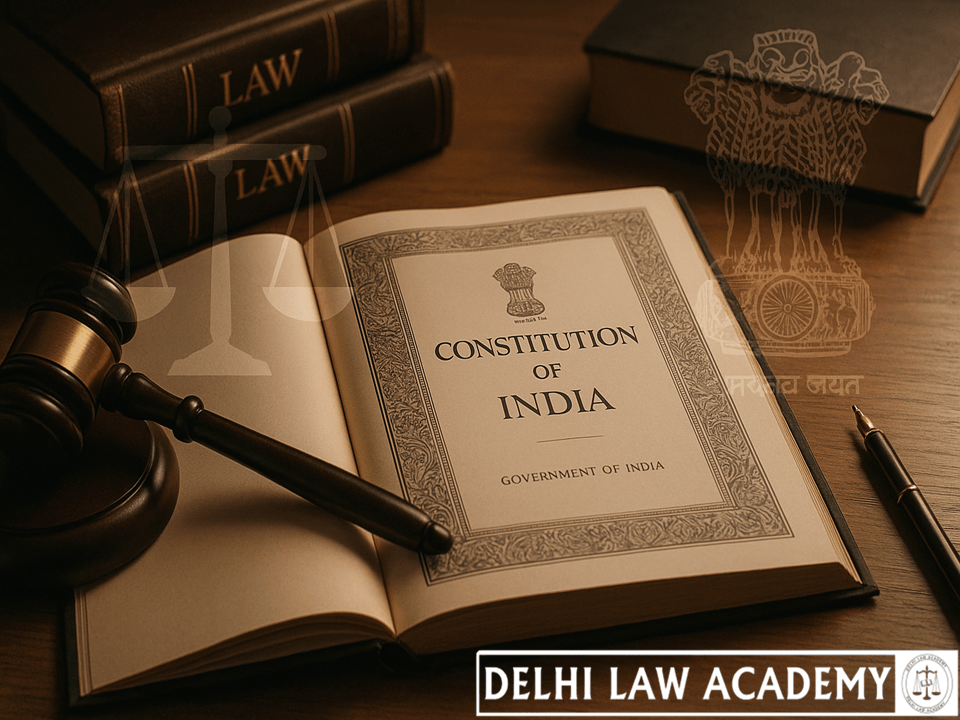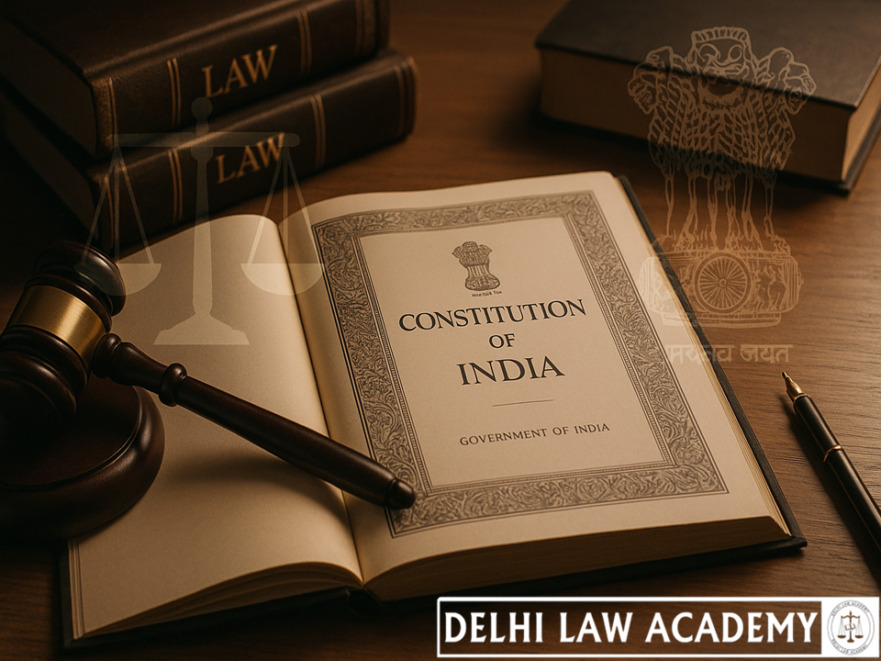
⚖️ Supreme Court & Comptroller and Auditor-General of India
Delhi Law Academy Jaipur | Notes for RJS, DJS & PCS(J) Judiciary Aspirants
📘 Constitutional Provisions – Articles 142 to 151
Article 142 – Enforcement of Orders
- An order made by Supreme Court shall be enforceable throughout the territory of India.
- Supreme Court may pass any orders for doing complete justice in any matter pending before it.
Article 143 – Advisory Jurisdiction
- President may refer to SC any question of law or fact of public importance for its opinion.
- Supreme Court may, after such hearing as it thinks fit, report to President its opinion thereon.
Article 144 – Authorities in Aid of Supreme Court
- All civil and judicial authorities in India shall act in aid of the Supreme Court.
Article 145 – Rules of Court
- Supreme Court may make rules with approval of President for regulating practice and procedure of court.
- Minimum of 5 judges are required to decide a case involving a substantial question of law as to interpretation of Constitution or for hearing a Presidential reference under article 143.
- All judgments of Supreme Court shall be delivered in open court.
- Opinion under article 143 shall also be delivered in open court.
- All judgments and opinions are to be made by a majority of judges present at the hearing.
- A judge has a right to deliver a dissenting judgment or opinion.
Article 146 – Officers and Servants of Supreme Court
- Officers and servants of Supreme Court shall be appointed by Chief Justice of India.
- President may, by rule, require appointments to be made after consultation with UPSC.
- Administrative expenses of SC, including all salaries, shall be charged upon the Consolidated Fund of India (CFI).
💼 Comptroller and Auditor-General of India (CAG)
Article 148(1) – Comptroller and Auditor-General of India
- There shall be a Comptroller and Auditor-General of India who shall be appointed by President.
- He shall only be removed from office in like manner and on like grounds as a Judge of Supreme Court.
Article 148(2)
- Every person appointed to be CAG of India shall, before he enters upon his office, make and subscribe before President (or some person appointed by him) an oath or affirmation according to the form in the Third Schedule.
Article 148(3)
- Salary and other conditions of service of CAG shall be such as may be determined by Parliament by law, and until so determined, shall be as specified in Second Schedule.
📘 Note:
- Law made by Parliament under this Article: CAG’s (Duties, Powers and Conditions of Service) Act 1971.
- Tenure of CAG under this Law: 6 years or 65 years, whichever is earlier.
- Salary of a CAG and his rights in respect of leave of absence, pension or age of retirement shall not be varied to his disadvantage after his appointment.
Article 148(4)
- CAG shall not be eligible for further office either under Govt of India or under Govt of any State after he has ceased to hold his office.
Article 148(5)
- Subject to any law made by Parliament, conditions of service of persons serving in the Indian Audit and Accounts Department and administrative powers of CAG shall be such as may be prescribed by rules made by President after consultation with CAG.
Article 148(6)
- Administrative expenses of the office of CAG, including salaries, allowances and pensions payable to persons serving in that office, shall be charged upon the Consolidated Fund of India.
Article 149 – Duties and Powers of Comptroller and Auditor-General
- CAG shall perform such duties and exercise such powers in relation to accounts of the Union and of the States and of any other authority or body as prescribed by any law made by Parliament.
Article 150 – Form of Accounts of the Union and the States
- Accounts of the Union and of the States shall be kept in such form as President may, on advice of CAG of India, prescribe.
Article 151 – Audit Reports
- Reports of CAG of India relating to accounts of the Union shall be submitted to the President, who shall cause them to be laid before each House of Parliament.
- Reports of CAG of India relating to accounts of a State shall be submitted to Governor of the State, who shall cause them to be laid before Legislature.
📚 For more detailed Constitutional Notes, visit
www.delhilawacademy.com
📘 Stay Ahead with Delhi Law Academy!
Get access to free monthly current affairs, read our insightful blogs,
and explore free study resources prepared by experts at DLA Jaipur. 🚀
💡 Frequently Asked Questions on Supreme Court & CAG of India
⚖️ What is Article 142 of the Indian Constitution?
Article 142 empowers the Supreme Court to pass any order necessary for doing complete justice in any matter pending before it. Such orders are enforceable throughout India. It ensures that justice prevails even when no specific law provides a remedy.
📜 What is the Advisory Jurisdiction of the Supreme Court under Article 143?
Under Article 143, the President of India may refer questions of law or fact of public importance to the Supreme Court for its opinion. The Court, after due consideration, reports its opinion back to the President. This is known as the advisory jurisdiction of the Supreme Court.
💼 Who appoints the Comptroller and Auditor-General of India?
The Comptroller and Auditor-General (CAG) of India is appointed by the President of India under Article 148. He can only be removed in the same manner and on the same grounds as a Supreme Court Judge, ensuring independence and impartiality.
📊 What are the main duties and powers of the CAG under Article 149?
The CAG audits the accounts of the Union and the States, along with any authority or body prescribed by law. He ensures accountability in financial management and reports directly to the President or Governors, depending on the level of government.
📘 How is the salary and tenure of the CAG determined?
As per Article 148(3) and the CAG (Duties, Powers and Conditions of Service) Act, 1971, the CAG serves for 6 years or until the age of 65, whichever is earlier. His salary and conditions cannot be changed to his disadvantage after appointment.
📂 Where are the CAG’s audit reports submitted under Article 151?
The CAG submits Union audit reports to the President, who lays them before both Houses of Parliament. For State accounts, reports are sent to the respective Governor, who presents them before the State Legislature for review and accountability.
Contact us
📍 Delhi Law Academy – Jaipur Branch
6C, Tower 2, Coaching Hub, Pratap Nagar, Jaipur – 302033
📞 Phone:
+91 9911916552
+91 8447285606
✉️ Email:
contactus@delhilawacademy.com

